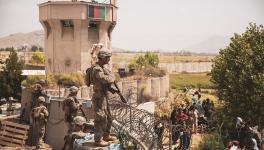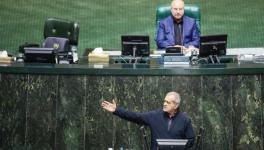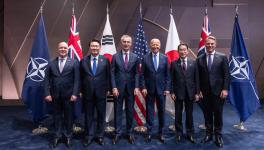Biden can be Charming. But Beijing Should be Wary of Sequels

Image Courtesy: Pixabay
President Vladimir Zelensky’s tour of Rome, Berlin and Paris has been a success, securing for Ukraine significant additional quantities of weaponry for the upcoming offensive against Russian forces. The high water mark was Germany’s announcement of a new package of military aid worth an estimated €2.7 billion, which will be the country’s largest delivery of arms to Ukraine.
The German package includes 30 Leopard-1 A5 main battle tanks, four new IRIS-T SLM anti-aircraft rocket launchers, dozens of armoured personnel carriers and other combat vehicles, 18 self-propelled Howitzers and hundreds of unarmed recon drones.
Zelensky said important decisions on “defending Ukrainian skies” were reached during talks in Italy on Saturday. In sum, Old Europe conveyed solidarity with Zelensky at a crucial juncture when all eyes are on the so-called Ukrainian offensive being the last throw of dice.
Last week, Newsweek quoted Henry Kissinger predicting that he believes the Ukraine war is coming to a turning point and expects negotiations by the end of the year, thanks to recent efforts made by China. Kissinger said, “Now that China has entered the negotiation, it will come to a head, I think, by the end of the year. We will be talking about negotiating processes and even actual negotiations.”
Indeed, from all appearance, China has comprehensively outmanoeuvred the US over the Ukraine crisis. Last Friday, the Foreign Ministry spokesperson in Beijing announced that China’s special representative on Eurasian affairs, Li Hui, will visit Ukraine, Russia, Poland, France and Germany starting May 15 aimed at discussing a “political settlement” to the Ukraine crisis. Washington was not mentioned as part of Li’s itinerary, but Beijing instead prioritised the European capitals that have urged China to play a more active role in the Ukraine situation.
Meanwhile, by extending a warm welcome to Zelensky, Rome, Berlin and Paris have completely ignored the Top Secret US intelligence documents that have been recently leaked, which smeared the Ukrainian president as a maverick who says one thing publicly and an entirely different thing privately, who poses as moderate but in reality is an inveterate hawk escalating the war right into Russian territory, and so on. Apparently, European countries do not seem to go along with Washington’s pressure tactic against Zelensky to escalate the war despite his grave reservations regarding Ukraine’s military preparedness.
However, on a parallel track, there are also signs of Washington also reviewing its earlier rejection of Chinese mediation. David Ignatius at the Washington Post who has been plotting the shift, exudes optimism in his latest column that the 10-hour long “intense meetings” spread over May 10-11 in Vienna between the US National Security Advisor Jake Sullivan and China’s Politburo member Wang Yi “actually seemed to be creating a framework for constructive engagement.”
Ignatius estimates that “some shared space seems to have emerged during the long, detailed discussions between Sullivan and Wang… They appear to have found a language for superpower discussion, like what once existed between the United States and both Russia and China but has been lost.”
On the other hand, Beijing has been betting that Germany, France and Italy who prioritise the recovery and growth prospects of their economies, hope to strengthen economic relations with China to bolster their economies — and are, therefore, inclined to pursue foreign policies that are different from the comparatively extreme policies of the US.
Indeed, French President Emmanuel Macron announced on Friday that Chinese group XTC New Energy Materials will set up a joint venture with France’s Orano in the battery sector in the northern French port city of Dunkirk for an expected investment of $1.63 billion. The venture is expected to create around 1,700 jobs.
That said, Ignatius is an influential columnist with a long record of transmitting the US establishment’s diplomatic signalling. At its most obvious level, his column today highlights a high level of keenness on the part of the Biden administration to engage with China regarding Ukraine, which could have fallouts for the US-China relationship.
Also, the Biden Administration seems to be pinning hopes that by engaging with China, it can create differences between Beijing and Moscow and drive a wedge into the Sino-Russian alliance. Ignatius claims that Moscow viewed with “dread” the Sullivan-Wang cogitations in Vienna.
The Biden Administration’s revised hypothesis is that China’s objectives and priorities in the Ukraine situation are basically at variance with the Kremlin’s and, therefore, the smart thing to do is to abandon Washington’s outright rejection of Xi Jinping’s peace initiative on Ukraine or berate China’s support to Russia but instead position the US as a cooperative interlocutor on peacemaking and nudge Beijing to put pressure on Moscow to compromise.
Fundamentally, the assumption here is that Russia can still be isolated on the geopolitical chessboard.
But the big question remains: Is the Biden Administration in a position to overcome the influential body of opinion in the US who also happen to be in alliance with top officials in Ukraine’s corridors of power?
Ivo Daalder, former US ambassador to NATO (in the Obama administration) and currently the president of the influential Chicago Council on Global Affairs, wrote a hard-hitting opinion piece today in Politico after a visit to Kiev that “Putin’s strategic failure will only be complete if Moscow comes to understand that Ukraine is permanently lost — lost physically, economically, politically and strategically. And ensuring that failure should be the ultimate objective — not just for Ukraine but for the West too.”
His thesis is that the strategic case for including Ukraine in the West goes to the core of the current conflict and any alternative would only prolong the conflict and pose new security challenges for the western alliance system. Now, how is such an integration to be achieved?
Daalder proposes: “Even without a formal end to the war, let alone real peace, the US and other NATO countries need to make clear that they’re committed to Ukraine’s security and that they will explore interim arrangements — just as they did for Finland and Sweden — until it becomes a full member.”
While the media attention is on the commencement of the so-called counteroffensive by Kiev, the locus of the Ukraine conflict is shifting to the NATO Summit on July 11-12 in Vilnius, Lithuania, which is less than two months from now, to which Zelensky has been invited.
Zelensky’s current European tour — he has been to Finland and the Netherlands also in recent weeks — can be seen as the run-up to the Vilnius summit. Simply put, the foreplay has begun. It is not the Ukrainian counteroffensive, stupid! Russia — and China — should expect some nasty surprises.
MK Bhadrakumar is a former diplomat. He was India’s ambassador to Uzbekistan and Turkey. The views are personal.
Get the latest reports & analysis with people's perspective on Protests, movements & deep analytical videos, discussions of the current affairs in your Telegram app. Subscribe to NewsClick's Telegram channel & get Real-Time updates on stories, as they get published on our website.
























